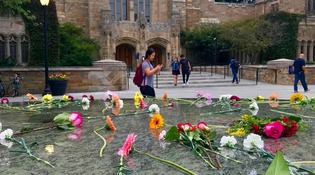 loading
loading
From the EditorThoughts on Yale in the #MeToo era Mark Alden Branch ’86In early October, students and others from the Yale community covered “The Women’s Table” with flowers and messages of support for survivors of sexual assault. View full imageThe furor that erupted after Brett Kavanaugh ’87, ’90JD, was accused of sexual misconduct has been painful and divisive all over the country. At Yale and among some Yale alumni, the allegations felt personal. Classmates and friends of Kavanaugh’s defended him; friends of the accuser defended her. Arguments broke out on Facebook pages, run by and for Yale alumni, that are usually filled with personal news and plans for get-togethers. At Yale Law School, a number of faculty who taught with Kavanaugh praised his scholarship and judicial record early on, but after the accusations came out, the dean joined the American Bar Association in calling for an investigation, 2,400 law professors nationwide opposed his nomination, and law students traveled to Washington to protest. But there’s an upside. The #MeToo movement and the public discussions of sexual misconduct allegations, including at the Senate hearing, have loosened the self-imposed silence of many women and men. The greater openness has made it somewhat less humiliating, somewhat more socially acceptable, to report this kind of intimate trespass. Improved systems are also encouraging more reporting. Take higher education. In the 1980s, the Department of Education required most colleges and universities (those receiving any level of federal funding) to put systems into place for handling complaints. In 2004, this magazine published an article by Emily Bazelon ’93, ’00JD, on how Yale College dealt with records and allegations of sexual misconduct. She found that members of the Sexual Harassment Grievance Board were skilled and dedicated—but the board was small, it kept no records (to preserve privacy), and few students knew about it. Other Yale schools had their own, widely varying arrangements. Over the years, Yale has built better systems and processes. Many more staff, all around the campus, have now been trained to hear Title IX complaints and provide information about resources. There is a central hub for reporting and counseling. A report listing (anonymously) every variety of complaint filed and its resolution is e-mailed to students, faculty, and staff twice a year. But all this raises a question. Are colleges and universities centers of sexual misconduct? Some believe so, but the statistics can be misleading—partly because of the very fact that colleges have dedicated resources that encourage reporting. In society at large, sexual misconduct is notoriously underreported. I did my own personal evaluation. I counted all the strangers, acquaintances, and friends who had touched me salaciously when they knew, most definitely, that they weren’t welcome. I estimate there were about a dozen people; only one was a Yalie. My unscientific conclusion: the world is wide, and the problem isn’t Yale—or colleges and universities in general. In fact, universities can be part of the solution. In 1977, when I came to Yale, freshmen arrival days were more or less a free-for-all. Today, Yale College’s first-year orientation is much more extensive, there are many supervised group events, and specially trained undergraduates provide workshops and support on sex-related topics for all first-years and sophomores. So I’m cautiously optimistic. Yes, sexual misconduct is alive and well, and even the best reporting system can’t prevent it. But now society is taking the problem more seriously. Journalists are on the case; people as powerful as Harvey Weinstein have been fired for old wrongs. Attitudes are changing. And secrecy is being slowly rolled back.
The comment period has expired.
|
|